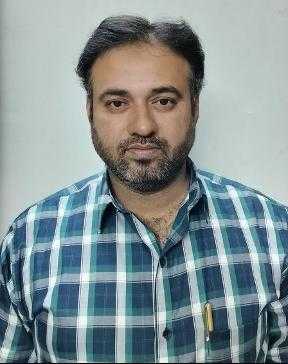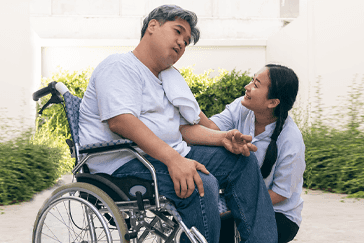
Expert Physiotherapy at Home
Certified physiotherapists visit you at home to provide focused, one-on-one care tailored to your needs. With no travel or waiting rooms, recovery happens in a setting that is comfortable, familiar, and built around your convenience.
Personalised Recovery Programmes
Every treatment plan is designed to suit your condition, goals, and pace. Our physiotherapists follow structured, evolving protocols to ensure consistent progress, with each session aligned to deliver meaningful results.
Trusted Physiotherapists. Real Results.
Our team comprises experienced, background-verified physiotherapists trusted by thousands of families. With a strong focus on safety, reliability, and clinical outcomes, we make recovery at home both effective and reassuring
Patient Testimonials
Portea Physiotherapists for Home Visits
Meet some of our experienced and dedicated healthcare professionals

Dr. Lokesh G
Physiotherapist
Specializations
Experienced in Neurological rehabilitation, Orthopaedic physiotherapy, and Paediatric care
Delivers structured, high-impact treatment plans across neuro, ortho, and paediatrics—ensuring safety, comfort, and measurable recovery at every stage.

Dr. Mohammed Sarwar
Physiotherapist
Specializations
Experienced in Neurological rehabilitation, Adult physiotherapy, and Paediatric care
Combines deep clinical expertise with a compassionate approach, supporting both adults and children through neuro and physical rehabilitation that promotes long-term independence and recovery.

Dr. Nelapati Divya
Physiotherapist
Specializations
Skilled in Orthopaedic rehabilitation, Manual therapy techniques, and Paediatric physiotherapy
Brings a personalised, hands-on approach to healing—combining structural expertise with paediatric sensitivity to restore movement, relieve pain, and improve everyday function.

Dr. Naveen V
Physiotherapist
Specializations
Trained in Pain management, Cardiac and Orthopaedic rehabilitation, Neurological care, and Neural tissue mobilisation
Brings clinical precision and empathy together—designing science-backed recovery protocols for pain relief, nerve mobilisation, and cardio-neuro-ortho rehabilitation across all age groups

Dr. Miloni Savla
Physiotherapist
Specializations
Holds an MPT in Orthopaedics with a focus on Musculoskeletal rehabilitation and strength recovery
Delivers focused, movement-oriented therapy grounded in orthopaedic science—helping patients rebuild strength, restore function, and return to daily life with confidence

what is vocal cord paralysis?
Content is medically reviewed by:
Shruti Bangera, Masters In Neurological Physiotherapy, Senior Physiotherapist & SME, Portea
Vocal cord paralysis is a medical condition that occurs when neural impulses are unable to travel through to your voice box, which is responsible for producing your voice.
The muscles get paralysed this way and prevent you from swallowing food and ingesting saliva through the windpipe. Vocal cord paralysis causes are commonly nerve damage stemming from different cancers, viral infections, and surgery. Common treatment methods for vocal cord palsy are surgery and voice therapy.
Your vocal cords resembled two muscle tissues and are located close to the entrance of the windpipe (trachea). Vocal cord paralysis makes one of these muscles unable to move and in rare cases, both.
This leads to vocal cord paralysis symptoms like difficulty breathing, swallowing and speaking. It’s not uncommon to experience a loss of vocal pitch, hoarse breathing, and experience a lack of gag reflex when you are diagnosed with this medical condition.
types of vocal cord paralysis
There are mainly two types of vocal cord paralysis:
- Vocal Cord Paresis: When the laryngeal muscles move abnormally due to partial interruption of nerve impulses, the condition is referred to as Vocal Cord Paresis.
- Vocal Cord Paralysis: When the laryngeal muscles are completely unable to move due to total interruption of nerve impulses to the voice box, the condition is called Vocal Cord Paralysis.
These Might be of Interest
what are some of the vocal cord paralysis causes?
Although doctors don’t know the specific reasons behind vocal cord paralysis, some of the known possible vocal cord paralysis causes in patients are:
- Neck and chest injuries: Trauma to the neck and chest regions may damage the nerves, thus severing the vocal cords or the entire voice box, rendering patients speechless.
- Stroke: A cerebral stroke may damage different areas of the brain and affect the travel of nerve impulses to the voice box.
- Vocal Cord Injuries: Injuries to the vocal cord resulting from surgery on the thyroid,
oesophagus , neck, chest, or parathyroid glands, resulting in vocal cord paralysis in patients.
diagnosis of vocal cord paralysis
Your doctor may initially ask you how long you’ve been facing problems with speech and test your voice and pitch to check speaking. If he suspects the vocal folds are damaged, he may order the following vocal cord paralysis diagnosis tests:
- Laryngeal Electromyography (LEMG) – This is a vocal cord paralysis diagnostic test which uses pins and needles to be inserted into the skin through the neck. These are used to record the strength and flow of neuromuscular signals from your brain to your vocal cords. A number of speaking exercises will be asked to perform by the doctor which will target those muscles and test their functionality.
- Endoscopy – A small, thin tube is inserted into your throat which includes a tiny camera used to inspect your laryngeal muscles (vocal folds). Any damage to the vocal cords will be screened through this medical procedure.
- Imaging Tests – Imaging tests like CT Scan, X-rays, and MRIs help determine other possible vocal cord paralysis causes in patients. Blood tests may accompany some of these imaging tests for further medical investigation.
vocal cord paralysis treatment
Vocal cord paralysis treatment will be determined by your doctor based on your medical condition and vocal cord paralysis diagnostic test. These are the following treatment options available for vocal cord paralysis:
Speech Therapy:
A physiotherapist will begin working with you on different vocal cord paralysis exercises which target your speech and weak vocal folds. Speech therapy is very effective for partial vocal cord paralysis as the weak laryngeal muscles are strengthened through various exercises which opens up the breathing as well.
Surgery:
Surgery is recommended for those who see no improvement despite doing the prescribed speech therapy exercises. There are different types of surgery based on the degree and extent of vocal cord paralysis:
- Bulk Injections – Collagen and fillers are injected into your vocal cords to move the affected muscles closer to the voice box or larynx.
- Phonosurgery – The vocal cords are repositioned in this medical procedure through restructuring.
- Tracheotomy – If your vocal folds are too close, your doctor may make an incision in the neck and insert a breathing tube at the opening of the windpipe. This bypasses the air blockage caused by the vocal folds and promotes proper air circulation via the hole in the neck.
when do you need us?
A part of vocal cord paralysis treatment involves regular physiotherapy exercises. It involves performing gentle exercises that don’t stress your vocal cords but instead work on them in a gradual and progressive manner.
Care must be taken when performing some of these exercises and improve breathing, which is where our team of physiotherapists come in. Speech therapy for vocal cord paralysis will speed up the recovery process by improving airflow and blood circulation to the vocal folds, and home remedies may be recommended to improve your current condition.
how we can help
Vocal cord paralysis exercises are no cakewalk for those who are new to it. If you are afflicted by vocal cord paralysis and need physiotherapy assistance, our physiotherapy services will come to your aid.
Our physiotherapists visit your home and assess your medical condition. Based on their diagnosis, you will be prescribed the necessary vocal cord paralysis treatment at home.
The physiotherapist will meet you every day and teach you how to perform them. Corrections will be demonstrated whenever you do them wrong, and after your cure for the vocal cord, paralysis progress is charted, based on its results you may be recommended to go for surgery.
summary
A vocal cord paralysis is not the end of life, and in fact, you can continue to enjoy living a fully functional life after surgery. If you have mild vocal cord paralysis, you may not be able to sing or do voice-based tasks that well but with a bit of practice and regular physiotherapy exercises, your voice box will be back on its feet.
Dietary changes may be recommended based on the results of your surgery, and you will be expected to adhere to them.
Meet Our Renowned Physiotherapists
Dr.L Swarna Harini-MPT/BPT – 6 years Experience
Dr. Hari Prasad M – MPT – 4 years Experience.
Dr.Neha Suhas Kulkarni – MPT- 4.5 years Experiences
More
References
Doctor Consultation
Nursing
Physiotherapy
Trained Attendant
Elder Care
Mother & Baby Care
Lab Tests
Medical Equipment
Speciality Pharma
Critical Care










